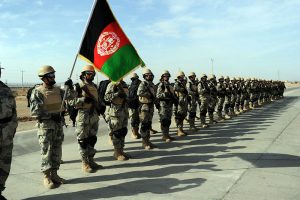When the first group of Afghan servicemen crossed into Tajikistan on June 21 and later to Uzbekistan on June 23 as the Taliban were making territorial gains, each Central Asian country reacted differently, despite experiencing the same security implications from the incursions.
Now Tajikistan’s approach seems to be converging with Uzbekistan’s as Dushanbe returned all the servicemen back to Afghanistan and announced additional measures to strengthen the border area with military troops. President Emomali Rahmon personally visited border guards to provide a morale boost. Turkmenistan’s response, however, remains fully uncoordinated. It chose the path of supposedly secret negotiations with the Taliban and denied news of Ashgabat militarily reinforcing its Afghan border with heavy equipment.
On July 5, Tajikistan ordered the mobilization of 20,000 military reservists for the reinforcement of country’s border with Afghanistan. Tajikistan’s president also visited two Afgan-Tajik border posts to check the readiness of military assets. He made speeches in what seemed to be an effort to stoke patriotic sentiments and emphasize the significance of the mission providing security on the border.
The situation on the Afghan-Tajik border has been quiet since July 7. On July 14, around 2,300 servicemen who had fled the Taliban were returned to Afghanistan. The presidents of Uzbekistan and Tajikistan held a phone conversation on July 5 and confirmed the readiness of their armed forces and law enforcement bodies to cooperate in securing their borders. Rahmon discussed the security situation with several leaders, but close military cooperation was discussed with Uzbekistan, exclusively.
The leaders of Kazakhstan and Russia discussed the security situation with Rahmon, and Russia offered bilateral and regional Collective Security Treaty Organization (CSTO) assistance. But none of these conversations was as concrete and practical as the talks with Uzbekistan, indicating the increased level of trust between the two countries and their willingness to solve regional issues without outside partners. The militaries of both Tajikistan and Uzbekistan since 2018 have held annual military exercises that involve responding to the exact scenarios on the Afghanistan border witnessed by both countries now.
By contrast, Turkmenistan is choosing to go it alone. After the first district on the Afghanistan-Turkmenistan border fell to the Taliban on July 7, Ashgabat reacted by secretly inviting the Taliban to Turkmenistan on July 11 to discuss the border and security matters. The Turkmen government reportedly requested the inviolability of its border between the countries and the stemming of the possible flood of refugees.
Ashgabat supposedly also reacted by strengthening its border with heavy military equipment. Officially Turkmenistan rejected such reports, saying that the Afghanistan-Turkmenistan border was a “border of friendship and cooperation” and required no military equipment.
The Taliban on several occasions confirmed they had no intentions to cross into neighboring countries. The most recent promise came when a Taliban delegation on July 8 reconfirmed that the movement’s seizure of territories will not encroach on the borders of Central Asian states. In September 2020, the head of Taliban movement’s political office in Qatar, Mulla Abdul Ghani Baradar, guaranteed the Taliban would pose no threats to the security of Uzbekistan and any other Central Asian states.
So far, Central Asian countries have abstained from condemning the Taliban for the territorial gains the group has achieved at the cost of the Afghan government’s control. Tashkent called the developments in Afghanistan the country’s internal matter, and Ashgabat even decided to negotiate with the Taliban right away to ensure guarantees upfront. The militaries of all three bordering Central Asian countries were put on high alert and were reinforced (though Turkmenistan denies it), but no activities have taken place that required their direct engagement.

































